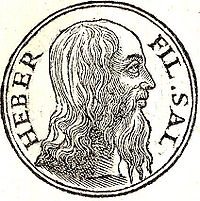- Eber
-
For other uses, see Eber (disambiguation).
Eber 
EberChildren Peleg
JoktanParents Salah Eber (עֵבֶר, ISO 259-3 ʕebr, Standard Hebrew Éver, Tiberian Hebrew ʻĒḇer) is an ancestor of the Israelites, according to the "Table of Nations" in Genesis 10-11 and 1 Chronicles 1. He was a great-grandson of Noah's son Shem and the father of Peleg born when Eber was 34 years old, and of Joktan. He was the son of Shelah a distant ancestor of Abraham. According to the Hebrew Bible, Eber died at the age of 464 (Genesis 11:14-17) when Jacob was 20. The Hebrew Calendar synchronises this date with 1817 BCE.
In the Septuagint and other Christian Bibles derived from it, Eber is called Heber and his father is called Sala. His son is called Phaleg, born when Heber was 134 years old, and he had other sons and daughters. Heber lived to an age of 404 years. (Septuagint Genesis 11:14-17)
In Jewish tradition, Eber, the great-grandson of Shem, refused to help with the building of the Tower of Babel, so his language was not confused when it was abandoned. He and his family alone retained the original human language, Hebrew, a language named after Eber (Heber), also called lingua humana in Latin. (There are different religious positions on this issue; see also Adamic language.)
The name "Ever" עבר (Hebrew root letters ayin ע, bet/vet ב and reish ר, transliterated in English to "Eber" or "Heber") are considered by Biblical scholars[citation needed] to be the roots of the word "Hebrew" (ivri עברי and ivrit עברית, in Hebrew), with "ever" most often meaning "side" or "beyond", but also region beyond or across, opposite side, or passage, as in me'ever מעבר and maavar מעבר in both Biblical and Modern Hebrew as spoken in Israel today.
- [Genesis 10:21] Also to Shem, the father of all the Children of Eber, and the older brother of Japheth, children were born. (NASB)
In some translations of the New Testament, he is referred to once as Heber ([Luke 3:35] ...the son of Serug, the son of Reu, the son of Peleg, the son of Heber, the son of Salah...); however, he should not be confused with the Heber of the Old Testament (different Hebrew spelling חבר), grandson of Asher ([Genesis 46:17] The sons of Asher: Imnah and Ishvah and Ishvi and Beriah and their sister Serah. And the sons of Beriah: Heber and Malchiel).
Theories about Eber
There is a legend that the Avars were descendants of Eber[citation needed] through children of Abraham and his third (or second, as the Talmud identifies her with Hagar) wife Keturah.
Eber (2303 BCE) son of Shelah (2333 BCE) and great-grandson of Shem (2468 BCE) is also the founding patriarch of the descendancy of Joktan and his son Jobab.
Linguistic association of "Eber", "Heber" and "Hebrew"
In the King James Version (KJV) of the Old Testament, the name "Eber" is used, while in the KJV New Testament, "Heber" is used instead, each referring to the same person. And in both KJV books, the word "Hebrew" refers to the descendants of this person. The confusion between "Eber" and "Heber" lies in transcriptional misunderstandings through ongoing layers of Biblical translation, as well as the differentiated cultural origins of the Old and New Testaments.
The origin of the names for Eber and the Hebrews, as used in European Christian languages, derived from Aramaic עבר ʿĒḇer and עברי ʿIḇrāy, as spoken in the Roman province of Judaea and by those Jews who escaped the province's destruction. When Greek-writing Jewish scholars compiled the Septuagint, the adaptations chosen for these names (for whatever reason) were Εβερ Heber and Εβραιος Hebraios. These names were adapted through Latin and French before reaching English as "Heber" and "Hebrew", and these names were used in the KJV New Testament.
However, the KJV Old Testament was largely translated not from Greek and Latin sources, but from existing Hebrew texts accessible to scholars at the time, employing a uniquely Anglo-Saxon method of adapting Hebrew words and names. As such, in the Old Testament, "Eber" was used without the H, likely reflecting the common Hebrew dialects used among the Jews of Europe. However, the KJV translators chose to use the New Testament name "Hebrew" (instead of "Ibrite" or "Eberite") as the canonical term for the descendants of Eber in the Old Testament as well, likely to avoid confusing lay readers.
As the King James Version of the Bible became the primary Christian scripture of Great Britain, the association of "Eber" with "Hebrew" in the English-speaking religious world became a permanent phenomenon.
Other than Jewish sources can be found in the ancient Irish history, here a clear story can be found on the relation between Eber and the Hebrew language.Template:Saint Augustine, City of God, 16:11
External links
- Easton's Bible Dictionary: Eber | Heber | Hebrew
- Smith's Bible Dictionary: Eber | Heber | Hebrew
- International Standard Bible Encyclopedia: Eber | Heber | Hebrew
- The History of Ireland: [1]
Adam to David according to the Hebrew Bible Creation to Flood Cain line Patriarchs after Flood Nationhood to Kingship Prophets in the Hebrew Bible Pre-Patriarchs (Bible) Patriarchs and Matriarchs Israelite prophets
in the TorahProphets mentioned
in the Former ProphetsMajor Prophets Minor Prophets Noahide prophets Other prophets Italics denote that the status as a prophet is not universally accepted. · rl are articles dealing with the prophet within Rabbinic Literature.In Islamic tradition In Qur'anic exegesis Note: These are prophets mentioned in Stories of the Prophets, Qur'anic commentary and exegesis, the Hadith and other Islamic literature; none are mentioned by name in the Qur'an. Muslims, however, believe that 124,000 prophets were sent to mankind, with twenty-five named in the Qur'an and the figures above identified in exegesis. Italics denote that the figure's status as a prophet is not accepted by all Muslims.Categories:- Prophets of the Hebrew Bible
- Prophets in Christianity
- City founders
- Torah people
- Prophets of Islam
- Book of Genesis
Wikimedia Foundation. 2010.

